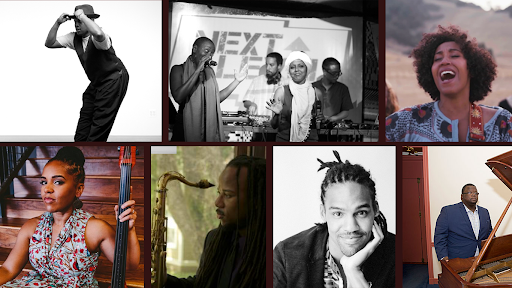Written By: Eve Elliott ’21
For many people, music has been a saving grace during the COVID-19 pandemic. Through TikTok dance tunes and exciting album drops, music brings joy and fosters connection.
Over the fall 2020 semester, students in the APPLES Service-Learning course “Music and the Community” explored how music composition, performance and collaboration could also work as a tool for service.
Mark Katz, the John P. Barker Distinguished Professor of Music and director of graduate studies, taught the course. Katz is the founding director of Next Level, a program that empowers American hip-hop artists to foster cultural diplomacy abroad.
Katz was excited to bring his passion for international music diplomacy to his students in North Carolina. Then, as the events of 2020 unfolded, Katz and his students realized that coming together to learn music and serve communities from all over the world would require creativity.
After working through the challenges of studying music online, Katz sought to show his students how their art can serve and strengthen communities.
He turned to the experts: a series of seven artists from different genres who invest in their communities through music. Following high-profile acts of anti-Black violence and the resulting surge of racial justice activism of 2020, Katz brought in Black artists who shared their insights on racial identity and equity in their art, their activism and the music industry. Pictures of the artists are featured in the picture collection below. Clockwise from the top left corner, the pictures show Junious Brickhouse, Sheika “Purple Haze” Norris, Rissi Palmer, Rahsaan Barber, Pierce Freelon, Braxton Shelley and Shana Tucker.

“I created an interview assignment in which groups of five students interviewed them to dig a little deeper,” Katz said. “They really get to know these amazing artists who are all activists in different ways. It got students thinking about racial reckoning in this country.”
Katz was also able to pay the artists to give live Zoom performances that inspired and engaged the students.
“A creative Zoom use came from a rapper from Newark, New Jersey, named Sheika ‘Purple Haze’ Norris” Katz remembered. “Students put words into the chat, and she rapped, improvising using those words.”
Using the lessons from their interactive Zoom classes, students took on their own service projects. With a range of musical abilities that ranged from “Spotify fan” to “seasoned performer,” the students sought out partnerships that fit their specific musical talents and interests. Katz was astonished by their work.
Students framed their service around the communities they wished to serve. Many reached out to their local schools and churches to find opportunities to serve.
“A student worked for his old school and made little music kits and decorated them for the students,” Katz recalled.
Other students brought their skills to new communities.
“One person taught hip-hop beat making in Charlotte,” Katz said. “One student volunteered with a Palestinian dance troup, another student with a Vietnamese dance group on campus. There was music from around the world.”
One student, Joey Lancellotti, thought to use his new skills to connect with past community partners. Lancellotti brought his lessons in music-related service to the friends he’d gained while serving pediatric cancer patients with N.C. Children’s Hospital.
“I made really awesome relationships with some of the patients who just have these amazing stories,” Lancellotti said. “I interviewed the patients and got their stories, then sat down and wrote down some ideas for a song. My best friend is a recording artist in Nashville, Tenn. We got on the phone for hours and grinded out an acoustic version of a song that told their story.”
Lancellotti, who saw the ability for music to connect people in class, reached out to an old friend who had also gone through cancer to share his story as well.
In the end, Lancellotti and his songwriting partner created a version of a fight song. He shared a copy of the song with the patients that inspired it and even passed it along to a teenager facing a cancer diagnosis for the first time. You can listen to the song below.
“They reacted so well to it,” Lancellotti said. “It was great, and now my friend actually wants to record a studio version of the song to share with people.”
Ultimately, Lancellotti hopes to connect the patients who inspired the song with his songwriting partner to celebrate the power of music to connect strangers and tell stories.
